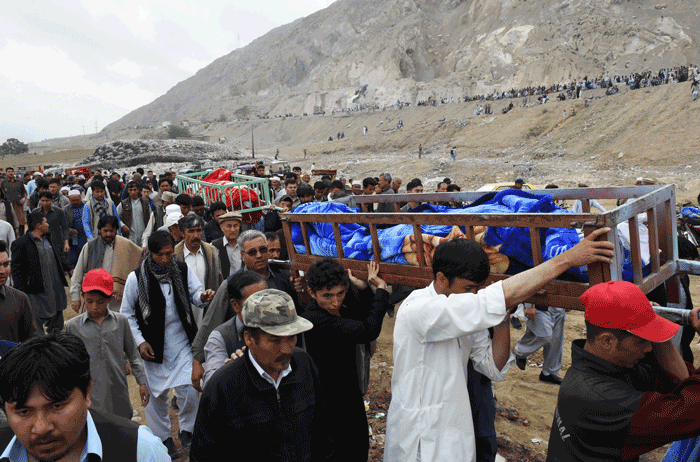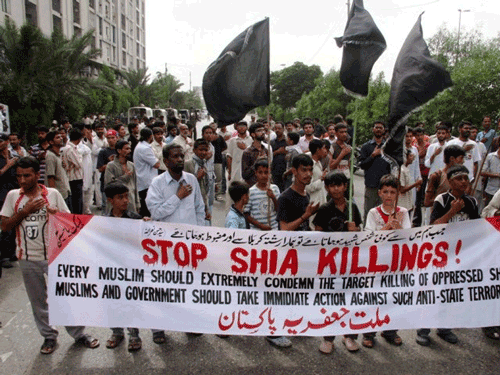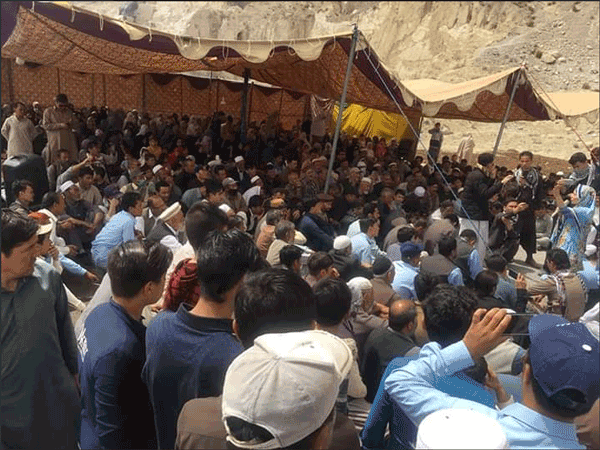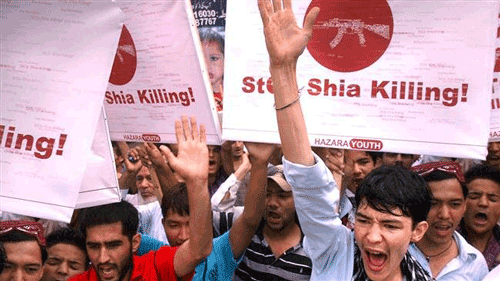Living on the Edge
By Adnan Aamir | Newsbeat National | Published 6 years ago

Funeral for Hazaras slain in the suicide attack in Quetta’s Hazar Gunj vegetable market.
The morning of April 12 turned out to be yet another devastating day for Quetta, after a suicide bomber wreaked havoc in Hazar Gunji vegetable market in the suburbs of the city. The targets were the Hazara vegetable vendors. Twenty people were killed in the attack, eight of whom were from the marginalised Hazara community.
The Hazaras have been under attack in Quetta for the last 17 years. The year 2013 was particularly deadly for them as two suicide blasts, within a gap of just one month, killed over 200 people. The security situation deteriorated in Quetta and the movement of the community came under threat. Hazara students stopped going to the University of Balochistan due to security concerns. Hazaras were killed even if they just travelled from Marriabad to Hazara town – the ghettos of the Hazara community located in the eastern and western parts of Quetta, respectively. The Hazara vegetable vendors were not spared either, if they dared to travel from Hazara town to Hazar Gunji.
In order to ensure the security of these vegetable vendors, the government envisaged a plan. On particular days of the week, all Hazara vegetable vendors were lined up in a convoy and escorted to Hazar Gunji vegetable market by the security forces. This practice was in place for the last few years and it had prevented attacks on the vendors.

On April 12, the vendors reached the market amid tight security. As they were purchasing potatoes, a large blast took place. Initially, it was claimed by the police that a bomb had been planted inside a potato sack. Those killed included shopkeepers and passersby. Later, it was confirmed by the security forces that this was a suicide blast and the targets were the Hazara vegetable vendors.
This was the first attack on the Hazara community after an interval of almost a year. In April last year, there were four targeted attacks on the community. Subsequently, Hazara activists, led by Jalila Haider, held a hunger strike. Later, the Army Chief, General Qamar Javed Bajwa, visited Quetta and assured protestors that Hazaras would be protected. After that, there was no attack on the community until April 12, 2019.
Sajjad Hussain Changezai, a North Carolina-based Hazara activist, said that if the Hazara Gunji attack had not happened, the Hazaras would have celebrated the passage of a peaceful year, but this was not meant to be. “To be honest, Hazaras have never been safe,” he told Newsline. “For us, peace is a period of uncertainty between two tragic incidents.”
Right after the blast, the Hazara community again grouped together to protest this attack. Under the leadership of Tahir Khan Hazara, Chief of Hazara Siyasi Karkunan (HSK), activists blocked the western bypass road of Quetta and erected a protest camp on the location. This camp got nationwide attention due to live broadcast of events inside the camp via social media.

Second day of the sit-in on the Quetta bypass, led by Tahir Khan Hazara. (Photos obtained from the Twitter page of Tahir Khan Hazara).
Political leaders, government officials, and civil society members visited the camp one after another. They expressed solidarity with Hazara protestors and some of them asked Tahir Khan to end the protest, which he refused to do until some assurances of security were provided to the community. In a video that went viral on social media, he was chastising government ministers who visited the camp and demanded that the protest end.
Tahir Khan openly claimed that the attacks on Hazaras are not part of the sectarian violence. “The attacks on the Hazara community are linked to the problem of Balochistan,” he said in his speech at the camp, arguing that terming the attacks as sectarian was tantamount to brushing the problem under the carpet.
Tahir Khan’s fiery speeches increased his popularity and it was obvious that other Hazara politicians would not like it. And as expected, the Hazara Democratic Party (HDP) criticised the protest. HDP has two members in the Balochistan Assembly and they are part of Jam Kamal’s government. The HDP not only disowned the protest, but also criticised Tahir Khan for chanting harsh slogans and using this protest as a publicity stunt.
“The only undesirable component of this episode is HDP’s unnecessary accusation that Tahir Khan Hazara is an anti-state element,” said Changezai. He added that this opportunistic point-scoring could have been avoided in this episode. “Arrangements could have been made whereby the parliamentarians and the Hazara Democratic Party and the Hazara Siyasi Karkunan would have complemented each other,” he argued.
Moreover, the responsibility for the attack was first pinned on the TTP, but it denied any involvement. Later, the Islamic State of Khorasan Province (ISKP) claimed responsibility for the attack and released a picture of the suicide bomber. The attack marks a dangerous trend in Balochistan, where the deadly ISKP has started targeting the Hazara community. This would have grave security implications for the province.
 Syed Fakhar KakaKhel, a senior journalist who has covered terrorism and militancy extensively in Pakistan, maintains that the attacks on the Hazaras are an extension of the sectarian war erupting in different parts of the Islamic world. KakaKhel believes that the instability in Balochistan makes it conducive for exploitation by foreign spy agencies. “This attack was sponsored by a foreign spy agency to settle scores with the state of Pakistan,” he told me.
Syed Fakhar KakaKhel, a senior journalist who has covered terrorism and militancy extensively in Pakistan, maintains that the attacks on the Hazaras are an extension of the sectarian war erupting in different parts of the Islamic world. KakaKhel believes that the instability in Balochistan makes it conducive for exploitation by foreign spy agencies. “This attack was sponsored by a foreign spy agency to settle scores with the state of Pakistan,” he told me.
Tahir Khan ended his protest camp after four days, following assurances from both the provincial and federal governments. Later, President Arif Alvi and Prime Minister Imran Khan travelled to Quetta and met with the heirs of the Hazara victims. This protest created shockwaves nationwide and put immense pressure on the governments in Quetta and Islamabad. However, it is highly unlikely that these assurances will prove to be enough to prevent future attacks, as the perpetrators are too powerful to be controlled.


